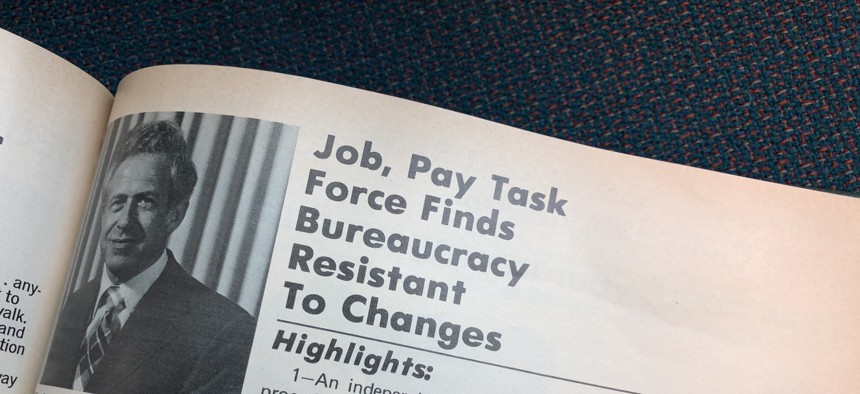
Federal Pay Reform: The More Things Change…
When it comes to commissions, studies and recommendations, everything old is new again.
In this, the 50th anniversary year of Government Executive, we’re taking an occasional look back at some of our most interesting and influential articles.
“That the federal government’s system—or rather proliferation of systems—for classifying and paying its employees is jerry-built, archaic and often inequitable is hardly open to question to those who have studied the situation most deeply.”
So began a story that delved into efforts to reform federal compensation and classification structures.
It was published in September 1972.
In the nearly 50 years that have elapsed since, some things have changed (the 1978 Civil Service Reform Act modernized many of the government’s bureaucratic structures, for example), but the underlying issues and political dynamics have remained much the same.
The 1972 article, “Job, Pay Task Force Finds Bureaucracy Resistant to Changes,” reports on the efforts of a congressional panel established to explore options for upgrading government’s classification and pay systems. The task force’s chairman, Philip M. Oliver, said federal classification standards were “totally inadequate … because there is no effective and cheap way to keep the standards current in view of changing technology, new programs and so on.”
The panel made a series of recommendations and wrote model legislation, but the Nixon administration chose not to prioritize it. (Sound familiar?)
Oliver noted that many interest groups—agency personnel directors, labor unions, Civil Service Commission staff members and federal employees—“favored a majority of the recommended reforms, balking only at one or a few proposals.” That, unfortunately, added up to a lot of balking.
“Once again,” the Government Executive story noted, “there are rumblings to the effect that this will be just one more study of a much-studied subject and that it will result in only a few reforms while major problem areas remain untouched.”
Spoiler alert: It was. And it wouldn’t be the last.
NEXT STORY: The First Great Career Civil Servant







